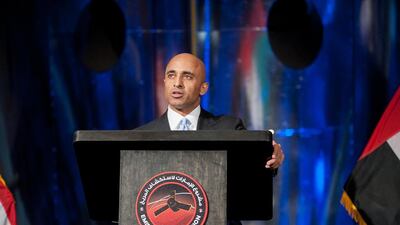The UAE ambassador to the US has said that his personal opinion was that the Emir of Qatar was not “fully in charge” to negotiate on the GCC impasse, now entering its third month.
Saudi Arabia, the UAE, Bahrain, and Egypt severed all diplomatic and transport ties with Qatar on June 5 over allegations it was supporting terrorist groups and interfering in the internal affairs of other countries. Doha denies the allegations.
"We're three months in now, and I'm more convinced than ever that they [Qatar] are not serious about sitting down and having a conversation about how this gets resolved," Yousef Al Otaiba told The Atlantic in an interview published on Monday.
Mr Al Otaiba said that it was his opinion Emir of Qatar Tamim bin Hamad Al Thani may not be “fully in charge” in his country.
____________
Read more:
Doha’s ties to Tehran confounds reasonable people
UAE responds as Qatar restores full diplomatic ties with Iran
Qatar crisis: What you need to know
____________
“It’s possible his parents continue to call the shots in Qatar,” he said. “I think there’s a possibility he [the Emir] might [want to negotiate], but I don’t think his father is interested.
“And I strongly believe that the father is still calling the shots.”
Mr Al Otaiba reiterated that Qatar was supporting a number of groups, designated as terrorist organisations and individuals by the UAE, US and UN.
“Outside of Iran, Qatar hosts the second-largest number of designated terrorists in the world, including 59 people that we’ve just designated, of which 12 are on the US list and 14 are on the UN list,” he said.
“They’re not in jail, they’re not under house arrest, they’re moving around freely and openly and raising money for Al Nusra [Front] and Al Qaeda, Libyan militias, and many many others.”
___________
Read more:
Russian FM holds talks in Kuwait before heading to UAE, Qatar
Gargash says restoration of full Iran ties 'embarrasses Doha'
___________
Mr Al Otaiba said there has not been any “substantial progress” in getting the issue resolved.
“We’re ready to sit down and negotiate with the Qataris, provided they are willing to sit down and negotiate with us without preconditions,” he said. However, said Mr Al Otaiba, Qatar won't get down to negotiation until the boycott is ended.
"That’s not going to happen,” he added.
The four boycotting countries are sticking to their 13 demands as well as the six broad principles that they say must provide a framework for any solution. The officials have said that they are open to talks on the implementation of their demands but not their content.
The demands include the closure of Qatar-owned Al Jazeera news channel, which the quartet says provides a platform for extremists and dissidents, and the shutting down of a permanent Turkish military base in the country.
The ambassador commented on Qatar’s re-establishment of diplomatic ties with Iran, saying that it “confirms the position we’ve taken and why we’ve taken it”.
However, Mr Al Otaiba added that if Qatar changes its behaviour, the UAE will immediately “welcome them back into the tent”.
“If they don’t, if they prioritise their relationship with Iran, their relationship with Hamas, and their relationship with Islamist militias in Libya and Syria — if that is more important to them than their relationship with us, then we wish them good luck, but they can’t do that and be our friends at the same time,” he said.
According to Mr Al Otaiba, there are two main threats in the region. Iran’s behaviour and extremism and terrorism.
“For us, Hizbollah, ISIS, Al Qaeda, they’re all terrorist groups. We’re not going to distinguish whether you’re a Shiite or Sunni — if you are a threat to the stability of our country, you are a threat, regardless of your religious beliefs,” he said. “I put Iran’s behaviour as another category. Iran is a sovereign state. You see that their behaviour is harming the region, you see that their support for terrorist and proxy groups is destabilising the region.
“Sunni extremism attempts to hijack our religion and then use it for political reasons to gain power, like the Muslim Brotherhood in Egypt, like Hamas in Palestine.”

